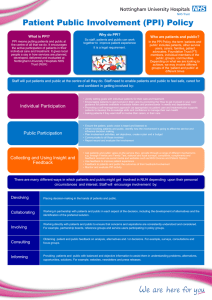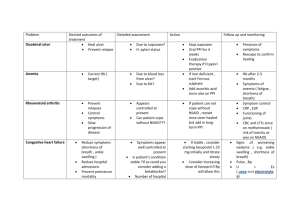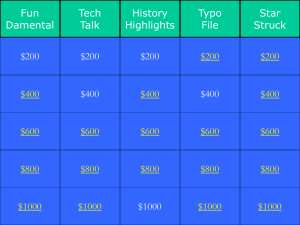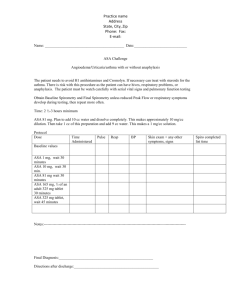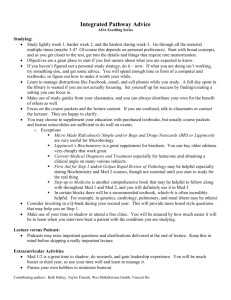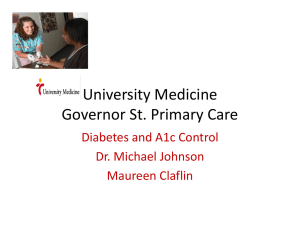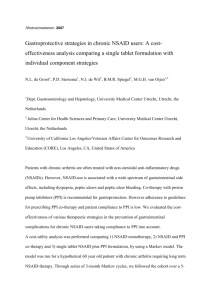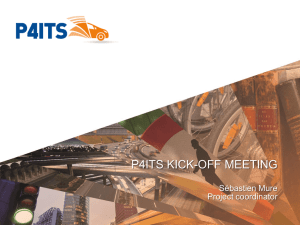Top 10 Things I Learned This Year
advertisement
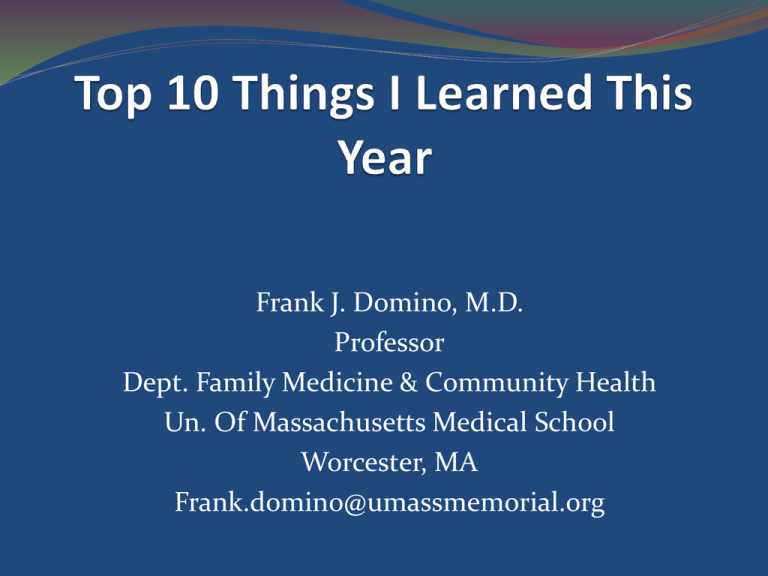
Frank J. Domino, M.D. Professor Dept. Family Medicine & Community Health Un. Of Massachusetts Medical School Worcester, MA Frank.domino@umassmemorial.org Disclosure Editor in Chief 5 Minute Clinical Consult Author and Editor for Up To Date Pri Med Curriculum Committee Author/Editor: Rxpalm, Inc. Author/Editor: www.Epocrates.com Editor: www.Familydoctor.org By the end of this session, you will Review new data that will change your practice about common medical problems Reconsider what you might assume is the “standard of care” Remain skeptical of how the medical literature influences the news, your patients, and someone’s income Which of the following is a result of Chronic PPI Use? 1. 2. 3. 4. ↑ Hip Fracture ↑ Community Acquired Pneumonia ↑ Rates C. difficile No Improvement in Asthma Control 5. ALL OF THE ABOVE Omeprazole (Prilosec) OTC March 2008 PPIs & Hip Fracture PPI -> Hypochlorhydria -> ↓ Calcium Absorption Review of 1.8 Million Brits aged >/= 50 yrs 13,556 Hip Fractures; After adjusting for cofounders Relative Risk of Hip Fracture among PPIs (> 12 months) = 1.6 [CI: 1.41-1.89] Risk Increased w/ duration of Tx & with ↑ doses Use of H2 RAs were analyzed; NO ↑ Risk JAMA 2006; 296: 2947-53, Yang, et al PPI & Pneumonia Cohort Study Italy: Children on PPI for 4 months increased risk of: Gastroenteritis OR=3.58 [1.87-6.86] & Comm. Ac. Pneumonia OR=6.39 [1.38-29] Pediatrics 2006: 117: e817-20; Canani, R. Case Control Netherlands: Adults using Acid Suppressing Rx Pneumonia OR 1.89 [1.36-2.62] JAMA 2004; 292: 1955-60; Laheij, R. PPI & C. difficile 1,100+ Hospitalized Pts on PPI Adjusted for Antibiotic Exposure C. diff OR 2.1 [1.2 – 3.5] (not for H2RA) AND, to decrease risk of confounding error, they performed: Case Control of 94 Inpatients with C. diff OR = 2.6 [1.3 – 5.0] CMAJ 2004; 171: 33-8; Dial Asthma & GERD 700 patients: inhaled corticosteroids treated with Nexium 40 mg bid or placebo Divided into 3 Groups: 1. One group had nocturnal asthma and no GERD, 2. One had GERD and no nocturnal asthma, 3. and one had both GERD and nocturnal asthma. ***Nexium did NOT improve any clinically significant Sx: morning PEF, use of rescue inhalers, or quality-of-life scores in any subgroup Am J Respir Crit Care Med 2006 May 15; 173:1091-7 Cochrane 2003 – No Benefit in GERD Tx on Asthma PPI’s and Side Effects 4 Articles in May 10, 2010 Archives Int Med: PPI’s Woman’s Health Initiative 130,000 women on PPI x 7.8 years ↑ Fx Risk of Spine, Forearm/wrist and total fractures 100,000 Hospital Discharges x 5 years for risk of developing nosocomial C. diff Infection H2RA (1.52) vs PPI/d (1.74) vs > 1 PPI/day (2.36) Arch Intern Med May 10, 2010 2. Sex and Drugs CDC: 2009 National Youth Risk Behavior Survey (YRBS) 1 in 5 High School students say they have taken a prescription drug without a Rx OxyContin, Percocet, Ritalin, Adderall, Xanax White Students: 23% Hispanic Students: 17% African American: 12% 26% of 12th graders, 20% Male & Female CDC: 2009 National Youth Risk Behavior Survey (YRBS) Alcohol: Marijuana: Prescription Tobacco: Cocaine: Ecstasy: Methamphetamine: 72% 36% 20% 19% 6.4% 6.7% 4.1% Passenger with Driver under Influence: 28% Sexually Active: 46%; 2/3 not used condom last IC http://www.cdc.gov/healthyyouth/yrbs/index.htm 3. Drugs: Show of Hands “How many times in the past year have you used an illegal drug or used a prescription drug for non-medical reasons?” ~400 patients Gold Standard: DAST-10 + Oral Fluid Testing Sensitivity: ~100% Specificity: ~75% Arch Intern Med 2010: 170(13): 1155-60 Sources of Drugs: You & Me Diversion: Unintended use of medication for unlawful purposes Using Pseudophedrine for Crystal Meth Using lawfully prescribed medications (narcotics, anxiolytics, amphetamines) for illegal purposes Diversion Perspective $8 Oxycontin sells for >$100.00 on street Drug Fact Prescription Opioids cause more drug overdose deaths than cocaine and heroin combined. 40% of teens and an almost equal number of their parents think abusing prescription painkillers is safer than abusing "street" drugs CDC/FDA 2008 30 Deaths/Day Prevalence of STI’s: 14-19 Females 838 females who completed a National Health & Nutrition Examination Survey 2003-04 Specimens (urine, self obtained vaginal swabs) GC, Chlamyida, Trichomonas, HS II, ↑ Risk HPV 24% were + for at least 1 HPV: 18.3% Trich: 2.5% GC: 1.3% Chlamydia: 3.9% HSV: 1.9% Pediat 2009; 124: 1505-12 4. Diabetes Update on the ACCORD Trial Gluc: A1C-- lower is not better BP: 120 not better than 140 to prevent Endpoints: Non-fatal MI, CVA or CHD Death Lipids: adding fibrate to statin did not decrease end points and may, in women, increase adverse outcomes NEJM; 2010: 362(17): 1628 Landing on the U-Shaped Curve Where is the Ideal A1C ??? 2 cohort studies, ~28,000 T2DM >/= 50 Yrs Compared Mean A1C and All Cause Mortality A1C Hazard Ratio for Death 6.4% 10.4% Insulin based vs. oral agents Conclusion: 1.52 1.79 1.49 Ideal A1C Level was 7.5% NEJM 2010: 362(17): 1563 Oral Agents Alone Insulin Based Tx Editorial: Glycemic Control in Type 2 Diabetes: “Time for an Evidence-Based About Face” “Tight glycemic control burdens patients with complex treatment programs, hypoglycemia, weight gain, and costs, and offers uncertain benefits in return. “Glycemic control efforts should individualize A1C targets so that those targets and the actions necessary to achieve them reflect patients’ personal and clinical context and their informed values and preferences” Montori; Ann of Intern Med 2009; 150: 803-808 American Diabetes Association American College of Cardiology Foundation American Heart Association Joint Position Statement “intensive vs. standard glycemic control have not shown a significant reduction of CVD outcomes” Tx Goals: “Blood pressure control, Lipid Lowering w/Statin, ASA & Lifestyle modification” AND: A1C < 7.0: “w/o Hx hypoglycemia, short duration of DM, long life expectancy, no CVD” A1C > 7.0: “w/ Hx hypoglycemia, limited life expectancy, advanced micro or macrovascular complications, extensive comorbidities, or long standing DM in whom the general goal is difficult to attain…” Diabetes Care 2009; 31(1): 187-192 Aspirin Recommendation for DM? AHA, ACC, ADA Position Statement on Primary Prevention in Diabetes Meta Analysis of 9 RCTs of Aspirin Low Dose ASA is “reasonable” for Pt with 10 Yr CVD risk > 10% & no risk for bleeding 2. ASA should NOT be recommended for men < 50 or women < 60 Yrs with no other CHD RF 3. ASA MIGHT be acceptable in the 5-10% risk 1. Diabetes Care 2010; 33: 1395 http://hp2010.nhlbihin.net/atpIII/calculator.asp?usertype=prof 5. Gout Low Dose Colchicine RCT of 1.8 mg in 1 hour (1.2 onset, 0.6 in 1 Hr) vs 4.8 mg in 6 Hr (1.2 onset, then 0.6-1.2 per hour) Outcome was >50% reduction pain @ 24 Hr and Adverse Event Low Dose High Dose Placebo Pain AE (D, SD, V) 31% 34% 50% 23%, 0%, 0% 77%, 19%, 17% 20%, 0%, 0% Arthritis Rheum 2010; 62(4): 1060 Low Dose High Dose Placebo Why did someone do a study of a Generic Medication? New Trends: Rx that Reinvent Colchicine: Generic: Colcrys 30 Pills 30 Pills $25 $170 Acetic Acid/Hydrocortisone Otic Generic 15 ml Brand Name 15 ml $8 $210.00 Doxepin (Sinequan) Generic Brand Pill Cutter 10 mg 3, 6 mg $19/90 $118/30 $ 2.00 6. Low Back Pain What Predicts Chronic Low Back Pain SR of 20 studies (10,000+ Patients) to see what predicts Chronic LBP at 1 Year Non-Organic Signs Mal-adapative Coping Behav. Functional Impairment Psychiatric Co-morbidities Low Health Status JAMA 2010; 303(13): 1295 Median LR 3.0 2.5 2.1 2.2 1.8 Opioid Use & Acute LBP Early opioid Rx & subsequent disability from back injuries “Receipt of opioids for >6 days doubled odds of disability” Spine 2008:15;33(2):199-204. Relationship between early opioid prescribing for acute occupational low back pain and disability duration 8000+ Workers Comp Cohort Pts who received Opioids disabled 69 days longer than not. “CONCLUSION: Given the negative association between receipt of early opioids for acute LBP and outcomes, it is suggested that the use of opioids for the management of acute LBP may be counterproductive to recovery.” Spine 2007; 32(19):2127-32 7. Pain Relief Running Hot or Cold RCT of 60 adults w/Acute Neck or Back pain 400 mg Ibuprofen + Ice or Heat Pack x 30 Min “no difference in pain severity in Cold or Heat groups before or after treatment” or in need for additional medication 80% would use same approach for next injury Acad Emerg Med 2010; 17(5): 484 Osteoarthritis and the Knee RCT of ~225 patients with OA of Knee Usual Care (home exercise, NSAIDs, PT) vs Spa Therapy (18 days “hydrojet Tx, massage under mineral water, mineral mud & mineral pool exercises) + Usual Care At 6 months: 50% of Spa vs 36% of Usual Care had “Minimal Clinically Important Improvement” Ann Rheum Dis 2010; 69: 660 Migraine: Aspirin, really?? SR of 13 studies; 4000+ ASA (1000 mg + 10 metoclopramide) vs others agents (Sumatriptan 50 or 100 mg) “Sumatriptan 50 mg did not differ from ASA alone at 2 Hr Pain Free & HA relief” Sumatriptan 100 mg was better than ASA+Meto At 2 hour Pain Free, BUT NOT HEADACHE RELIEF & had > Side Effects Cochrane DSR 2010 Acetaminophen & NSAIDs Together, again SR 21 studies, 1900 patients for Pain Control Paracetamol vs. NSAID vs Para+NSAID “Combination of Para. And NSAID was more effective than Para. Or NSAID alone in 85% and 64% of relevant studies, respectively” “Current evidence suggests that a combination of Para. And an NSAID may offer superior analgesia compared to either drug alone. NO increase in adverse events from combination Anesth Analges 2010; 110: 1170 Seabreeze 1 Part Vodka 3 Parts Cranberry Juice 3 Parts Grapefruit Juice 8. Food and Drugs Grapefruit Juice & Statins Grapefruit Juice inhibits intestinal C P-450 3A4 Can inhibit first pass metabolism and may result in ↑ serum concentrations of some drugs. Can reduce P-450 by ~45% Clinically: 1 case report of a 40 y/o woman on 80mg Simvastatin, daily exercise, skydiving, and eating 1 grapefruit/day x 2 weeks Use Pravstatin or rosuvastatin Nutrit Journal 2007; 6:33 Am Fam Phys 2006; 74:605 Why be on a Statin??? Meta Analysis of 65,000 “intermediate to high risk individuals without history of CVD” and Statin use and All Cause Mortality “Use of statins in this high risk population was NOT associated with a statistically significant reduction in All Cause Mortality” Arch Intern Med 2010: 170(12): 1024 Warfarin and Food High vitamin K intake can ↓effectiveness of warfarin Large amounts: ~14 oz of high Vit. K vegetables Typical servings (4 oz) have little impact on INR. 2005 Dietary Guidelines for Americans recommends: 3 cups/week of dark-green vegetables (contain ~100-570 microg/serving) of vitamin K1. Nutr Rev. 2005 Mar;63(3):91-7. Cranberry Juice: Ancedotal reports of interaction “Moderate consumption does not affect anticoagulation” Am J Med 2010 123(5): 384 9. AHRQ: Update on Prevention Grade A. Folic Acid for Pregnancy: 0.4-0.8 mg/day B. Mammography (50-74) Biennial B. Obesity: start Age 6 Years B. Screen Adolescents for Depression C. Mammography < 50 years I. Screening for Hyperbilirubinemia for infants www.ahrq.gov CA: 59 (4): 215 - 275 Summing the data Man screened is 48 times more likely to be harmed than saved at 9 years after diagnosis; Harms: Impotence, Incontinence, mental anguish, and “even death” Screening doubles risk of Dx but does not significantly decrease risk of dying 1985: 8.7% risk of Dx; 2.5% risk of death 2005: 17% risk of Dx; 3% risk of death Is it really worth it? Boyle & Brawley Conclusion “Testing has been based on blind faith in early detection as opposed to being based on evidence of a decrease mortality” “Prostate Cancer screening and treatment of early disease is also a profitable industry” “If we are to stem the spiraling costs of health care, we must move toward the use of evidence based, rather than faith based or profit based practice of medicine.” “The collective data clearly cannot justify mass screening and indeed appear to justify support for a recommendation against mass screening.” “Shared decision making.. should include discussion of the quantified risks and benefits.” CA: 59 (4): 215 - 275 Colonoscopy Safety Post Colonoscopy surveillance 21,000 adults -GI Bleeding 1.59/1000 exams (Risk ↑ w/Warfarin, but not ASA/NSAIDs -Perforations 0.19/1000 exams -Diverticulitis 0.23/1000 exams -Postpolypectomy Synd 0.09/1000 exams Overall Incidence of SE 2.01/1000 exams Clin Gastroent Hepat 2010; 8(2): 166 10. All the other stuff How long is your average day? 6000 British civil servants lifestyle; x=7.5 Hr/d 60% male, 40% female; 39-61 Yrs x 11 years Outcomes: Fatal MI, Non-Fatal MI, Angina Adjusted for CHD Risk Factors Conclusions: 3-4 hours of overtime (beyond 7.5 Hr) 60% ↑in risk of Outcomes European Heart Journal 2010 Life Expectancy of Men in US White Black Physician 73.0 68.7 Lawyers 72.3 62.0 All Professionals 70.9 65.3 All Men 70.3 63.6 Am J Prev Med. 2000 Oct;19(3):155-9. Vitamin D Vitamin D’s job is to regulate serum Ca Annual High Dose Vitamin D & Fractures RCT of 500,000 IU D3 x 3-5 Years ↑ Risk of Falls (83/100 Person Yrs vs 72/100 PY) ↑ Risk of Fractures (4.9/100 PY vs 3.9/100 PY) JAMA 2010; 303(18): 1815-22; Editorial 1861 Calcium Supplementation Meta Analysis of 15 Trials, ~12,000 Evaluated trials of calcium Supp. And CHD Calcium Supp of > 500 mg/day (Without Vitamin D Supplementation) Hazard Ratio MI = 1.31 Non-Signif. Increase in risk of CVA, Death, & composite Endpoint of MI, CVA or Death BMJ. 2010 Jul 29;341: First BB for CHF, now COPD??? Retrospective analysis 2230 patients w/COPD Death: COPD Exacerb Beta Block 27.2% 42.7% Non BB 32.3% 49.3% Mortality benefit in seen in cardioselective BB (Atenolol, Metoprolol) Arch Intern Med 2010; 170(10): 880 Summary 1. Use PPI’s for < 1 Yr, then Step Down 2. Screen for Rx drug use, limit their use 3. Screen teens for STI’s 4. Diabetes: A1C goal of 7.5 unless no comorbidities, ASA only for risk > 10% 5. Gout: Colchicine 1.2, then 0.6 @ 1 Hr Summary 6. Acute Low Back Pain: no Narcotics 7. Pain Relief: 1. NSAID + Hot or Cold, Spa Tx 2. Migraine: ASA 1000mg + 10 Metoclopramide 3. NSAID + Acetaminophen Safe & Effective 8. Statins, Warfarin and diet 9. Screening: ∆ Breast & Prostate Ca; Colon-safe 10. Keep the work to < 10 hours per day Frank .domino@umassmemorial.org Frank J. Domino, M.D. Frank.domino@umassmemorial.org
